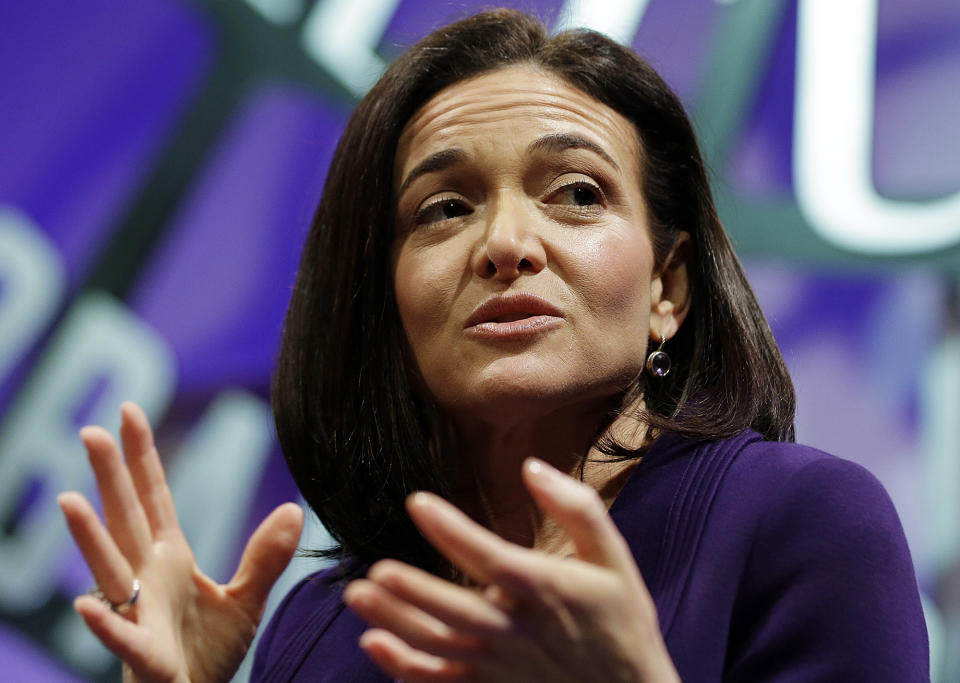Sheryl Sandberg has 2 useful pieces of advice for Facebook advertisers

PARIS—The chief operating officer of the world’s dominant social network did not show up in person at the Viva Technology conference here Friday. Of course not—Sheryl Sandberg appeared via video chat.
After brief uncertainty over whether her feed could get patched through to the screen behind the stage (see, even tech leaders can’t count on video chats working on the first try!), the Facebook (FB) COO appeared above her interviewer, Maurice Lévy.
Sandberg, speaking from Facebook’s offices while sipping a cup of coffee, fielded questions from Lévy, until recently the CEO of Viva Tech co-host Publicis Groupe (PUB.PA), with amazing aplomb. She never wandered off message and rarely let an “uh” slip. (Should she ever run for office, woe betide anybody who faces her in a debate.) And attendees watching with an interest in advertising on Facebook—spoiler alert: Sandberg wants you to do just that—would have come away with useful advice.
Ad advocate
It made sense that when speaking via video to a marketing executive, Sandberg spent so much time discussing video ads. They benefit from Facebook’s massive scale—she called its rapid growth “the fastest adoption of a communications technology the world has ever known”—and its near-ubiquity on mobile devices.
But you can still screw them up. Sandberg offered two tips that too many advertisers don’t seem to grasp.
One is to assume a distracted audience.
“You need to put your key point up front, in the first two to three seconds,” she said. “They need to work with the sound on or off.”
The other is not to recycle—don’t throw an ad cut for TV on Facebook. “You want to create natively,” Sandberg advised.
Do those things right, she emphasized, and you can reach an audience of unparalleled scale: “There has never been a better time to be a marketer.”

There’s probably never been a better time to be a Facebook ad executive, either. The company has been doing so well that some media observers worry about how much Facebook, along with Alphabet, Inc. (GOOG, GOOGL), dominates online advertising. One analyst estimated that Facebook alone racked up 77% of online advertising’s growth in 2016, leaving little for competitors—including Yahoo Finance’s parent company Verizon (VZ).
And as Google moves to incorporate a limited ad blocker to its Chrome browser while Apple (AAPL) starts to jam some common ad-tracking techniques in its Safari browser, the appeal of Facebook ads that will appear in its apps all the time should only increase.
Privacy: it’s complicated
Sandberg was cagier when Lévy asked about Facebook’s commitment to privacy. That’s a tricky topic for the company, since people won’t share their info on the service unless they think only their friends will see it—while advertisers won’t buy ads unless they think Facebook will show them to people with genuine interest in the topic.
“Privacy is core to everything we do,” Sandberg said. She pointed to the social network’s efforts to make it clear to its users who will see whatever they’re sharing. That’s a legitimate point—I can’t seem to go two weeks without Facebook reminding me that I can choose who sees what I post.
“We remain very focused on this, because it’s so important to people—definitely in Europe, but it’s clear around the world.”
Indeed: One month ago, the EU fined Facebook €110 million for not disclosing its plans to link the information of its own users and that of the WhatsApp messaging app it bought in 2014 for $19 billion. France separately fined the company €150,000 for not walling enough of its users’ data from its advertisers.
Facebook’s privacy policies and politics will only get more complicated in the European Union next May. That’s when the EU’s General Data Protection Regulation will enter into force across the continent. This sweeping reform will add such requirements as a mandate that social networks let their users take their data to another site—something Facebook’s Instagram doesn’t support today.
Diversity up and down the line
Sandberg also held back when Lévy inquired about Facebook’s commitment to diversity—a topic she declared “huuugely important” but which, like privacy, has earned her employer criticism.
“We know that more diverse teams make better decisions,” she said. “That, for tech, means more women and more underrepresented minorities.”
But Facebook’s own numbers show it’s making scant progress on that front. Its July 2016 diversity report revealed at senior leadership levels, women represented only 27% of the total, while blacks and Hispanics each accounted for 3%. On Facebook’s eight-member board, Sandberg is one of only two women.
She had a better story to tell about how Facebook has made its workplace policies more family-friendly. For instance, it now gives four months of paid leave to a new parent and extended immediately-family bereavement leave to 20 days.
A few minutes later, the interview ended. Sandberg blew the audience a kiss, picked up a piece of paper, and went back to work in California.
(Disclosures: I moderated three panels at Viva Tech and had my travel expenses covered.)
More from Rob:
CES Asia shows where consumer tech is heading in one of its dominant markets
The big issues we want Apple to address in macOS High Sierra
How Washington is throwing away its shot at protecting your privacy
YouTube thought a giant American flag wasn’t ‘advertiser friendly’
Email Rob at [email protected]; follow him on Twitter at @robpegoraro.
